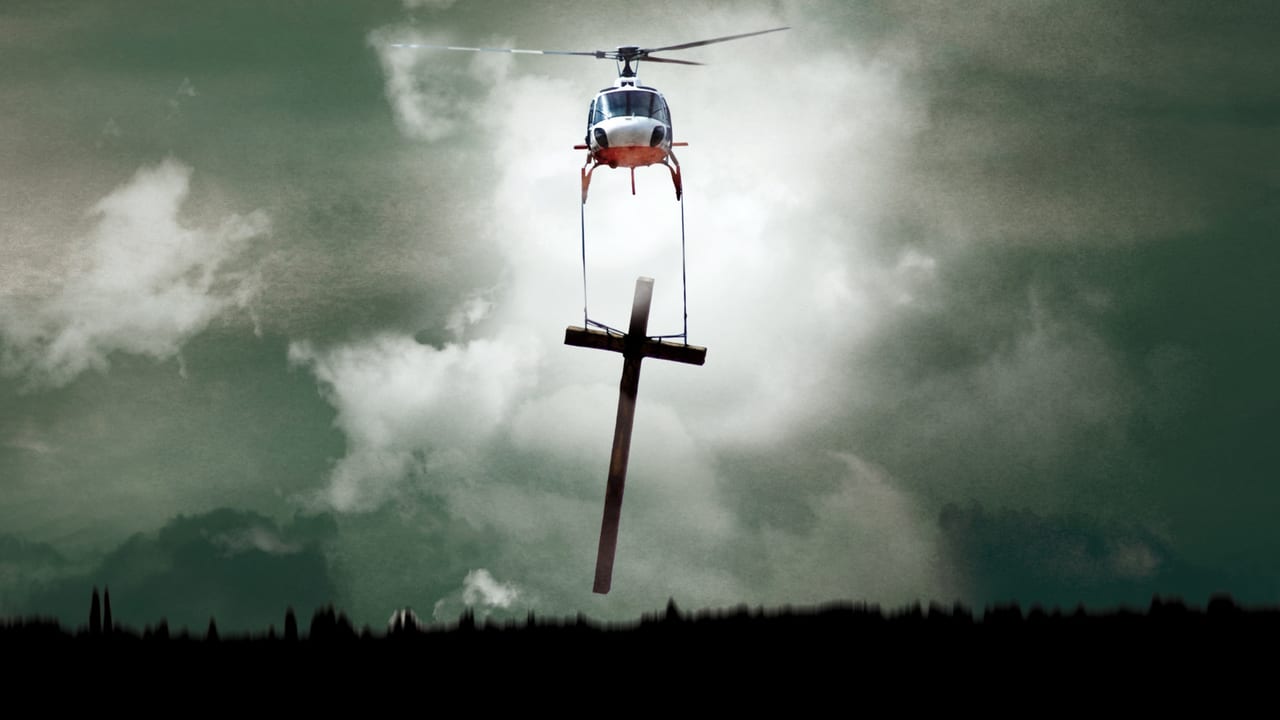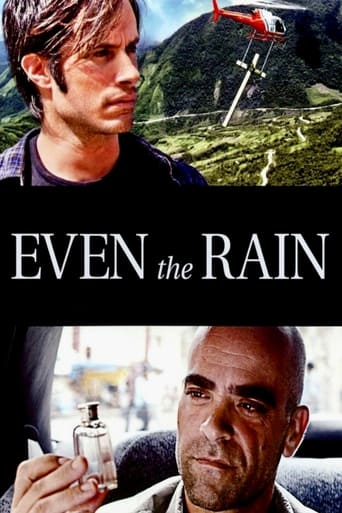

Amazing worth wacthing. So good. Biased but well made with many good points.
... View MoreIt is neither dumb nor smart enough to be fun, and spends way too much time with its boring human characters.
... View MoreBy the time the dramatic fireworks start popping off, each one feels earned.
... View MoreStrong acting helps the film overcome an uncertain premise and create characters that hold our attention absolutely.
... View MoreMakes people understand Indian culture, how capitalism works, shows art and real life, what politics is about. There is much here to savor, including scenes reminiscent of the best of Werner Herzog and Costa-Gavras, Dennis Hopper's The Last Movie, and Jorge Sanjines' Yawar Maliku (Blood of the Condor). Three beautiful male actors fight for hearts and minds. Gael Garcia Bernal gets a run for his money from his co-stars, especially newcomer Aduviri as the pint-sized water activist. There is a late scene where Costa tries to get Sebastian over a depression that's left him temporarily bedridden. No, they don't go there, but one can fantasize – it's the ultimate reason we keep going to the movies.
... View More"No problem can be solved from the same consciousness that created it" - Albert Einstein In a film within a film, director Sebastian (Gael Garcia Bernal) and producer Costa (Luis Tosar) are shooting in Cochabamba, Bolivia in the year 2000. The film they are working on proposes to depict Christopher Columbus' exploitation of the indigenous native population in his voyage to the Americas and the effort of two priests to stand up to the Catholic Church. Written by Paul Laverty, the regular screenwriter for British director Ken Loach, and dedicated to the late progressive historian Howard Zinn, Iciar Bollain's openly political drama Even the Rain takes on the past history of exploitation of native populations, showing a parallel to current history.The film developed through Laverty's desire to dramatize the life of Bartolomé de las Casas, a Dominican friar who becomes an anti-slavery activist in defiance of the church and his native Spain. Shot in the high Andes because of budgetary constraints, Even the Rain attempts to conflate three levels of exploitation: the historical treatment of the Native Americans by the Spanish conquerors in the 16th century, the actual attempt by Bolivia to cede control of the country's water supply to a British-American corporation, and the filmmakers' cost-cutting that results in the Quechua population being paid only $2.00 an hour as extras.Opening with a "La Dolce Vita" shot of a wooden crucifix being transported to the mountains by helicopter, the film moves to an open casting call in Cochabamba as hundreds of Bolivians line up to audition for a role in the projected film. Turned away by the producer when the quota of locals is filled, Daniel (Juan Carlos Aduviri), a vocal political activist demands that the Bolivians be hired even after they are told to leave. As a result of his strong personality, he is selected to play the role of Hatuey, the first Indian to be crucified for resisting the Spanish and Christian empire.A problem arises, however, when Daniel becomes the leader of a local group protesting the social injustice entailed in Bolivia's privatization of its own water supply (a true event that forbade the native population from collecting their own rainwater). Even after Daniel tells him "You don't understand, water is life," Costa demands that the young actor give up his political campaign to concentrate on the film which needs him desperately. As the director, Sebastian likewise must walk a thin line between balancing his ideals with his powerful desire to present a revisionist history of Columbus to the world. "The protests will be forgotten, but the film will last forever," he argues.Tosar is outstanding as the arrogant producer who is drawn unwillingly into the political protest. Overheard on a phone call, Costa brusquely tells a foreign investor how he is putting one over on the locals, not realizing that Daniel, standing only a few feet away from him speaks English. Eventually, however, Costa is forced to choose between the success of the film and the demands of his conscience staring at him relentlessly.Even the Rain tells us that understanding the past is meaningless unless that knowledge can be made relevant to the present day, a lesson that the characters must learn the hard way. In lesser hands, the film could easily have become didactic or preachy, but Bollain maintains a steady hand and the result is an engaging and powerful film that not only speaks out loudly against injustice, but does so with poetry and passion.
... View MoreIn Iciar Bollain's film 'Even the Rain', a Mexican film crew travel to Bolivia to make a film about the historical exploitation of indigenous Americans by European settlers. But they're motivated by the low cost of filming, and, when the locals who play the movie's numerous extras get involved in a political revolt, it's unclear whose side the film-makers are really on. The crew includes an idealistic director, his hard-nosed producer and mentor, and a cynical, boozy leading actor: but the characters are in no way clichés, and the way that they develop is a key part of the real film's success. Gael Garcia Bernal is as usual good as the director, but the whole cast is excellent, the film raises serious questions about the control of common assets, and even the film within a film appears to be something one would pay to see. The sad thing is that the issues explored - a world where even the rain is privatised - are very real in the actual world.
... View MoreRarely have i been so hesitant on how to judge a movie - it seems at the same time exceptionally good and rather weak, both with respect to it artistic form and its political content.Regarding the content, as mentioned by several commentators, a guiding theme of the movie is to make you feel and understand in which ways not much changed about the oppression of the South of the world by the North and of First Nations by immigrants to the new world; and even more importantly, that for bettering this, it's not enough for the average European to just be good and help the poor, because that merely leads to the paternalistic and condescending behaviour shown by the film's protagonists towards their indigenous workers. In short, the depiction of the dialectics of oppression, privilege and solidarity - in particular the voluntary, cheap, incomplete kind of solidarity - is relentless and far above average.On the other hand, the supposed topics of the movie are hardly even touched: I learnt a lot more about the Cochabamba water war from the user comments here on IMDb than from the film itself, it doesn't really explain what that war was all about. There is a bit more material about Columbus, De las Casas and their time, but it's all fragmentary, symbolist, and doesn't form a coherent picture, as it would be needed to really understand anything about history.Regarding the artistic form, i'd call this "Epic Theatre" in the Brecht'ian sense, as flabbergasting as that may seem in our post-modern times: Not only by the fact that the plot of the movie is "turning a movie", but by many other details as well, the spectator is frequently made aware the s/he is watching a play. To name just one example: People read from historical letters, then actually go on to comment why they read from those letters, and propose interpretations of the text, just like Brecht's chorus. Or imagine, in a movie, actors telling the stage director: "There are more important things than turning a movie" - and walking away from the scene. Fragmentation techniques, interruptions, contrast and contradiction, all these defamiliarizing elements of Epic Theatre abound, and even elements of the typical simplistic and abstract scenic design can be found in some parts of the movie in the movie. The overall effect is intense, this is certainly exceptionally artful, very unusual and worth seeing. Unfortunately, there are several artistic defects as well. Most of the characters are rather schematic and not very convincing, in particular in their change and development, and some turns of the plot seem contrived and artificial. Even worse, the Epic elements are not used for their proper purpose, which is making the audience think, deeply understand the social conditions at hand, and critically reflect them. Sure, the alienating effect is sufficient to make you aware that you are watching an explicitly political movie - but as i said, information is missing to really understand and reflect the alleged topics. You are merely left in diffuse indignation about the injustice of the world, with some equally vague hints that it's both possibly to individually oppose and collectively fight injustice. That alone is not news, really; the depiction of both options is neither very convincing nor in any way specific.Altogether, i deem the movie far from perfect as a work of art; but it is so diverse in its content and form that there are certainly many ways to view it, and more than one aspect that's worth seeing. Thus, i recommend you see for yourself, i don't think your time will be wasted.
... View More